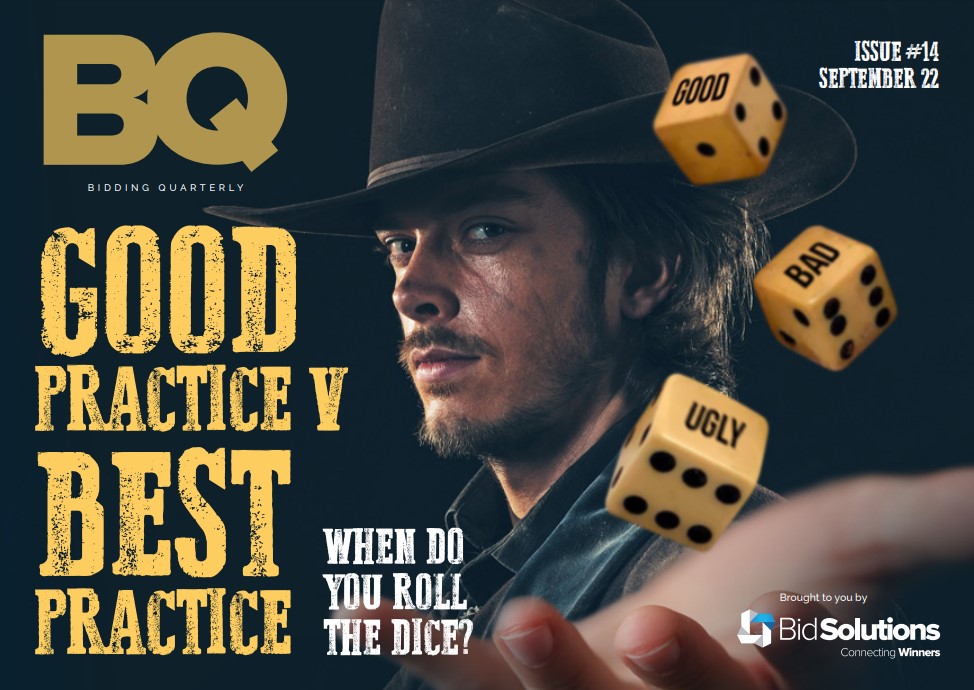
I may get shot down in flames for this one, however, here goes…
My name is Pippa Birch and I do not follow APMP’s best practice in my work.
I may be one of the very few in the world who has every single flipping certification available, but I do not follow the Body of Knowledge (BoK) word by word. Although it is probably the only certified ‘best practice’ we are exposed to in the world of bids and proposals, much of it is irrelevant to my work as a UK-based bid consultant focussed on public procurement. I had years of experience before I found the APMP, have access to several bidding books by others, and good old Mr Google has his benefits in some situations.
“So why on earth get all those APMP badges then?”, I hear you ask.
Because the APMP is the only recognised professional body dedicated to our profession which allows me to demonstrate to my clients that I know what I am talking about (please correct me if I’m wrong). My knowledge has been validated by someone other than me. And clients like to see badges. As well as to win, obviously, and we help them do that all the time.
I took my APMP Foundation about three years after I went freelance. At that point, I realised I needed to seek some sort of continued professional development. The Shipley (other Approved Training Organisations are available) two-day writing course caught my eye as the only thing that seemed to be around at the time on Google. So I invested in myself and toddled off to London, where I was bamboozled by quite a lot of jargon I’d never heard of, in what I had been doing for many years. Had I been doing it wrong all this time or did I just not understand as it was so American? Despite these worries, I threw myself into it, discovered my bidding ‘Dad’ in Tony Birch, and achieved my Foundation. This was the springboard to being introduced to an amazing community of people who understood what I did.
“Wait a minute!”, you shout, “But you don’t use it in your daily work? Why on earth not?”
Because I built up my own successful way of doing things over the years before I found the APMP. Much of it is similar to be fair – planning, checking out the competition, storyboarding, reviews, action captions, etc. I even developed a comprehensive Bid Management System, based on ISO standards, that continues to provide excellent value to my clients’ commercial, precontract and operational teams (blows own trumpet). Although quite often the reason is we just don’t have time to implement best practice – certain corners have to be cut (sensibly) to get a compliant submission in.
“We are still confused…”
APMP best practice works, as long as those of us in the UK tailor it to our own, successful methods. It works as long as we approach it with the knowledge we do not have to rigidly follow it chapter and verse. It’s about making a professional judgement on the people, bid requirements and timescale available.
I want to pare APMP best practice down for smaller organisations. It is so focussed on large corporate bid teams that it forgets about the small companies with little or no bidding function. That’s where we, as consultants, can come in with a stripped back, simpler version of good practice; scalable for all situations. Writing this also reminds me that I have a Pipster system of ‘how to do bidding stuff’ in the pipeline (that catchy title may well be changed). I just need to spend some time on it. I know there is also a new standard to come from our friends at APMP, working with BidCraft and BSI, who are UK-based companies. I am really looking forward to seeing what this is all about.
Ultimately, I think there might be room for something else that is focussed on promoting our profession and best practice specifically to the UK market. Something that embraces good practice from across the UK – there is some great stuff out there. Something the people we work for will understand, alongside the APMP’s work. A conversation for another day perhaps?
“So what value does APMP hold in terms of best practice for you?”
Since I took that very first Foundation course, I’ve gone on to get all the certifications, as well as coach others in their Practitioner and Professional courses, and mentor other APMP UK members aspiring to improve their career prospects. At present, I do think the APMP best practice is a good foundation for all things bidding, and for those learning their trade. The only one I know of. In fact, I have invested a lot in my team attaining their certifications, including the Bid and Proposal Apprenticeship.
I think I want to revisit my first statement.
My name is Pippa Birch and I do use the structure and the flavour of best practice from the APMP to ensure I continue to help my clients win.
And they are winning. That’s why we do this stuff. I will continue to champion APMP best practice, certification and the bidding community. But I will also continue to do things in my own way, a way that works for me, my staff, my clients, and the situations I am faced with. I will also seek out new ideas and ask those around me for their opinions and experience. I will constantly evolve my offering to my clients while championing excellent practice from every source.
If we did everything the same, every time, via a prescribed method, we would essentially be robots. And then we may as well use automation and AI, and the human element would be lost forever. As Clint Eastwood’s character famously says in The Good, The Bad and The Ugly, “Every gun makes its own tune”.
This article was written by Pippa Birch.
Pippa has been a Bid Writer for 20 years, working as an employee for major companies within the Highways and Civil Engineering Sector before going freelance in 2012. Pippa and her team write for companies across a variety of sectors (construction, facilities management, custody and forensics) although core clients are from highways and civil engineering. Pipster Solutions has become a successful, sustainable business with over 40 clients.

